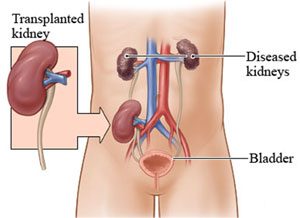General aspects of surgery
A kidney transplant in Delhi is an operation to put a healthy kidney (from a donor) inside the body. There are two types of donors:
- Live donors: A living donor can be a relative, a friend, a co-worker or any other person who is willing to give a kidney to someone who needs it. A person only needs a healthy kidney to live.
- Dead donors: A dead donor is someone who has recently died.
You may need to have tests to see if the donated kidney is compatible with your type of tissue and blood type. Good tissue compatibility reduces the chances of your body rejecting the new kidney. They will also evaluate you to make sure you do not have significant heart or lung disease or other diseases, such as cancer, that could reduce your life expectancy.
Kidney transplant surgery usually lasts about 3 hours. During the surgery, you will place the donated kidney in the lower abdomen, connect the blood vessels of the donated kidney to the arteries and veins of your body, and connect the kidney ureter donated to the bladder. The blood can then flow through the new kidney and the kidney will begin to filter and eliminate waste and produce urine.
The new kidney usually starts working immediately. In most cases, diseased or damaged kidneys are not removed unless you have a severe kidney infection (pyelonephritis), kidney cancer, nephrotic syndrome, or extremely large polycystic kidneys.
What to expect after surgery?
You will have to stay in the hospital for several days after receiving the new kidney. In some cases, it may take time for the new kidney to produce urine. Therefore, you may have to undergo dialysis and take medications, such as diuretics, to help the new kidney remove excess water and salt from the body.
After the surgery, you will have to take medications to suppress the immune system. These medications are used to help prevent the body from rejecting the new kidney. You should take these medications for the rest of your life.
During the first weeks or months after surgery, your body may try to reject the new kidney. This is called acute rejection and occurs in about 1 in 10 people in the first year after transplant. Most of the time, acute rejection can be treated with medications to prevent rejection (immunosuppressants).
Chronic rejection (also known as the chronic failure of allotransplantation) is a gradual and progressive process of loss of renal function and can occur many months to several years after surgery. The specialists do not fully understand the cause of chronic rejection. There is no treatment for chronic rejection. Most people return to dialysis or receive a new transplant.
Why is it done?
Kidney transplant in Delhi is done so that a healthy kidney (kidney of a donor) can do what your sick kidney can no longer do. Kidney transplant is used when you have severe chronic kidney disease (kidney failure) that cannot be reversed with any other treatment method. You will not be able to have this surgery if you have an active infection, another life-threatening illness such as cancer, or severe heart or lung disease.
Effectiveness
If you have severe chronic kidney disease and opt for a kidney transplant, you may be able to live longer than if you choose to treat your kidney disease with dialysis only.
In the past, transplants using a kidney from a first-degree relative, such as their father, mother, brother or sister, were the most successful. But thanks to modern medicines to prevent rejection, the kidneys of people who are not related to you also work well. Transplants from living donors or from dead donors can be successful.
Risks
The risks of having a kidney transplant include:
- Rejection of the new kidney.
- Serious infection
- Bleeding
- Reaction to the anesthesia used for surgery.
- Failure of the donated kidney.
To think
A kidney transplant may be a better treatment for you than dialysis since survival rates are better after transplant. You can also live a more normal life because you will not have to undergo dialysis. Although a kidney transplant is an expensive procedure, it can be less expensive than long-term dialysis treatments.
There is often a long wait before receiving a kidney from a donor. And there is no guarantee that the transplant will be successful. There are fewer complications in people who are good candidates for surgery and who do not have other serious medical conditions that can limit their life expectancies, such as unstable coronary artery disease or cancer.
Not all people can have a kidney transplant. In general, you will not be able to have a kidney transplant if you have an active infection or other life-threatening illness, such as cancer, or severe heart or lung disease.
After having a kidney transplant, you will need to take medications that suppress the immune system (anti-rejection drugs or immunosuppressants) to help prevent the body from rejecting the new kidney. You should take these medications for the rest of your life. Since these medications weaken the immune system, you will be at increased risk of serious infections. There is also the possibility that your body still rejects the new kidney, even if you take these medications. If this happens, you will have to start dialysis and may have to wait for another kidney transplant.
Immunosuppressants also increase the risk of other diseases, such as skin cancer and lymphoma. You will have an increased risk of diabetes, high blood pressure, heart disease, cataracts, and liver inflammation (cirrhosis) if you take these medications.


